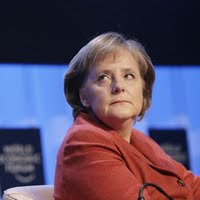Today, German Chancellor Angela Merkel will become only the second German leader in history to give a speech to both houses of the U.S. Congress. One issue she may avoid raising is her new coalition government's controversial commitment to remove all U.S. nuclear weapons from German soil within the next few years. By formally adopting the commitment as a core element of its platform, the German government has dramatically focused attention on what has until now been a low-key debate within NATO over whether to retain nuclear weapons as a core element of the alliance's strategy.
Although the precise number and location of the weapons is classified, experts estimate that some 20 U.S. B-61 nuclear bombs are stored at a German Air Force base near the village of Buechel, in the southwestern state of Rhineland-Palatinate. The Luftwaffe pilots there continue to simulate dropping the bombs from their nuclear-capable Tornado fighter jets in training exercises.
Germany's new foreign minister, Guido Westerwelle, adamantly stuck to his campaign pledge to seek the withdrawal of all nuclear weapons from German soil within four years. Calling them "a relic of the Cold War [that] do not increase our security," Westerwelle argued that by eliminating all nuclear weapons from Germany, the country would "set a good example when it comes to disarmament." Westerwelle, whose expertise lies in domestic economic policy, has never made clear which other governments might follow such an example, or how. He is scheduled to arrive for official talks in Washington this Thursday, when the nuclear issue is more likely to be raised, though perhaps not publicly.

